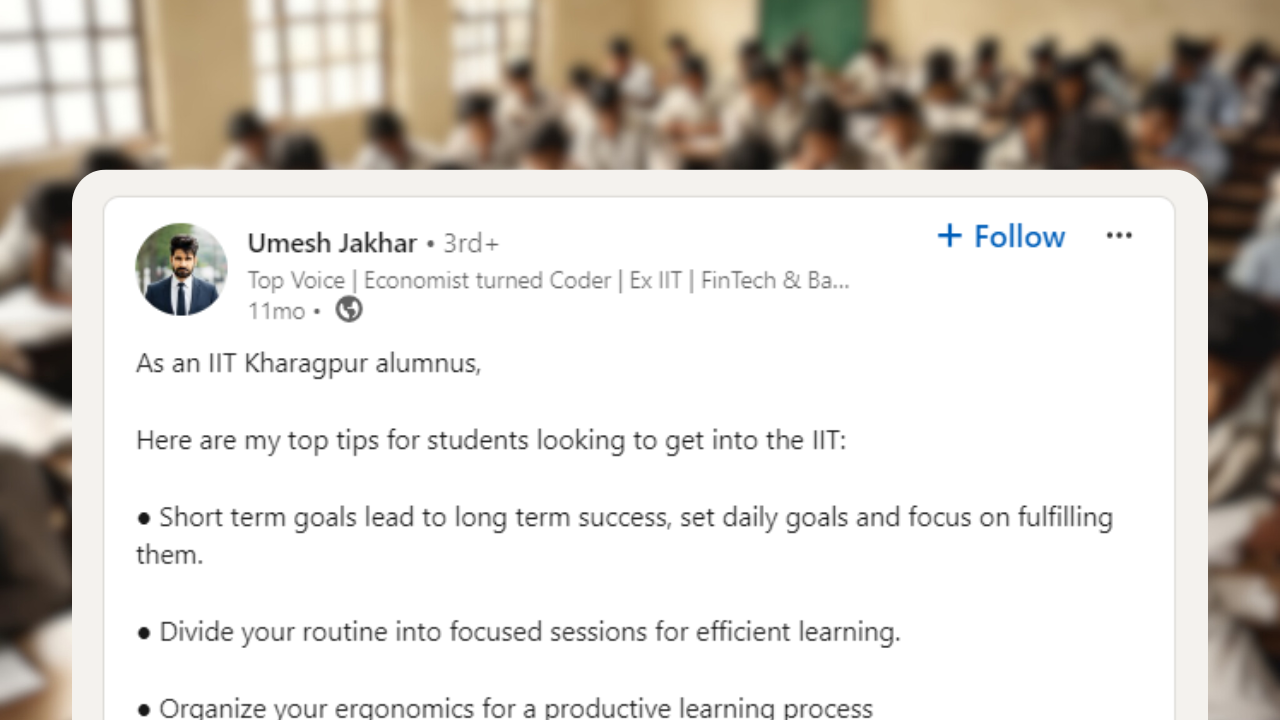Additionally, an IIT degree provides unparalleled career opportunities, with graduates in high demand by prestigious companies both domestically and internationally, frequently commanding attractive starting salaries and rapid career advancement.
However, gaining admission into an IIT by cracking the challenging Joint Entrance Exams (Main and Advanced) required thorough planning and dedicated efforts. Every year lakhs of candidates apply for the admission test, with close to a lakh being eligible for the Advanced round. Among that, only a few thousand candidates make it into securing an admission into the prestigious IITs across the country.
IIT alumnus’ top tips for aspirants
Umesh Jakhar, an Education influencer who is also an IIT Kharagpur graduate of 2018 batch, took to the professional networking platform LinkedIn – sharing his top tips for students aspiring for IITs.
Here’s what the IIT Kharagpur alumni had to share:
- Short term goals lead to long-term success; set daily goals and focus on achieving them.
- Divide your routine into focused sessions for more efficient learning.
- Organise your ergonomics for an effective learning process.
- Use textbooks instead of online materials to avoid distractions.
- Reach out to seniors for assistance whenever necessary.
- Finally, prioritise your studies while also engaging in recreational activities and taking breaks.
The alumnus is advised aspirants on how to achieve long-term success by setting short-term goals, using efficient learning techniques, and developing good study habits. He emphasised the importance of prioritising goals, creating a daily checklist, and scheduling study sessions. The post also emphasised maintaining ergonomic comfort, using textbooks, asking for help from seniors, and balancing study and recreational activities. This advice highlights the importance of diligence, focus, and balance in academic pursuits.
Here’s the official post-
FAQs
1. How do I get into engineering colleges in India?
To get admission to engineering colleges in India, you need to take entrance exams. The main ones are JEE Main (for IITs, NITs, and government colleges) and JEE Advanced (for IITs only, but you must pass JEE Main first). Some states have their own exams, and some universities also conduct separate ones. Besides exams, you must meet certain eligibility criteria set by the exam bodies and colleges, like having minimum grades in Class 10 and 12 and meeting age requirements.
2. How can I become an engineer after 12th grade?
After finishing 12th grade, you can become an engineer by taking entrance exams. The popular ones are JEE Main (for top colleges) and JEE Advanced (for IITs, but you need to clear JEE Main first). Some states have their own exams, and some universities might have their own too. Alongside exams, you need to meet the eligibility criteria of the institutions, like having minimum grades in 10th and 12th grade and following age restrictions. The process includes registering for exams, applying to colleges, and participating in counselling sessions where seats are allocated based on exam performance.
3. Do I have to take JEE for engineering college admission?
Not all engineering colleges in India require JEE scores. While top government colleges and IITs do, there are other options available. States have their own exams, universities may conduct separate ones, and some colleges offer direct admission based on Class 12 results or their own tests. Research the colleges and their admission criteria to find the best fit, considering factors like location, specialization, and JEE requirements.
4. What are the minimum qualifications for JEE?
To apply for JEE Main, you need to have completed Class 12 from a recognized board. You can take the exam up to three years after Class 12, and there’s no upper age limit. However, these are just the eligibility criteria for JEE Main. The engineering college you choose might have additional requirements, like specific Class 12 marks or subjects studied. So, while qualifying for JEE Main gets you to the exam hall, meeting the college’s specific criteria is crucial for admission. Check the JEE Main website and respective college websites for more details.


